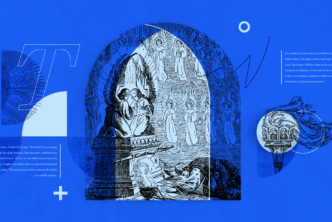It’s definitely not a new challenge. Nearly a half-century ago, Christian thinker Francis Schaeffer asked “How should we then live?” in a landmark book by the same title (pulled from Ezek 33:10).
So then—how should we? As believers today, we’re still pondering that question.
The irony is the further our culture slides into a postmodern ditch, the more relevant the perspectives of earlier Christians seem to become. As author J. Warner Wallace puts it, the first Christians were an “energized body of believers equipped to change the world. Today’s Church can learn something from the Early Church.”1
But even beyond the earliest examples in the book of Acts, Christians throughout history have experienced many of the same challenges and frustrations we face. They wrestled with materialism and obedience to God, with sharing their faith and worries and distractions and more.
But God used them to make a difference!
How do we know? Their recorded prayers often revealed how they lived out their faith in a hostile environment.
And if that’s so, how might those previous generations advise us to live as Christians in a very non-Christian world? Let’s look at seven prayerful insights these earlier believers left behind.
1. Keep your armor on
Although the mid-nineteenth century had its share of rosy optimists, Scottish church leader Thomas Chalmers in 1850 also clearly recognized ever-present challenges for believers—then and now:
May we never forget that Christianity is a warfare, (and) that in every generation of the Church believers have their difficulties to contend with; that the life of a Christian is a life of perpetual vigilance; that while we stay in the world we have to struggle with its vices, with its allurements, with the passions and infirmities of our nature, and with that contempt which fashion and frivolity and false philosophy have often annexed to all that is serious.2
In other words, keep our eyes open and our armor on.
Puritan Lewis Bayly (1575–1631) liked to pray this when he arose in the morning:
As you have now wakened my body from sleep, so, I beg you, waken my soul from sin and from worldly security. As you have caused the light of day to shine in my physical eyes, so cause the light of your word and Holy Spirit to illuminate my heart.3
2. Run from money-loving
If Chalmers in the 1850s recognized challenges other generations faced, perhaps he had read the writings of Ephraim the Syrian (AD 306–373), who left us this heart-stirring prayer:
Lord, may love of money be put away in our conversation. Money has been the lord over our freedom! Let this money disease be swept away from us. Take away the wealth that is so familiar and pleasant to us. Cut away that evil in our life, and take away the wealth that distracts us in our church. Instead, let the church collect souls, and in marvelous measure!4
So freedom from materialism gives freedom to live in fresh hope. And early church father Chrysostom (AD 347–407) would have agreed. He once prayed,
Lord help us to put aside the things of this world, in favor of the good things to come. This way, we will obtain both, by your grace.5
Then from Philip Doddridge (1709–1751):
Moderate my desires for worldly possessions by reminding me how uncertain and unsatisfying they are. While others are laying up treasures on earth, may I be rich towards God.6
3. Be still and listen
Adæus was an early missionary to Mesopotamia, Syria, and Persia. Sometime in the third century, his preaching was instrumental in the conversion of Maris of Persia, who then became a disciple of Adæus. In a short prayer that has survived the centuries, they asked God to “restrain our thoughts … so they do not wander amid the vanities of this world.”7
In much the same way, Ephraim the Syrian believed God had the power to help us maintain a healthy thought life. He prayed:
Voice of the Father, the world is noisy. Our mind wanders. Make still those other voices, and let us find quiet in you. For by you the sea was stilled from its storms.8
4. Just say no—and yes
Believers during the Reformation and Puritan years often had to oppose the state-established church of that day. Just as importantly, they also had to stand against the snares and temptations of the outside world. Sound familiar? But while their prayers often naturally included a brave “No!” to the world—they also said “Yes!” to God’s better plan. Menno Simmons (1496–1561) prayed:
The world once loved me and had captured my affections. I was ungodly and I carried the banner of unrighteousness for many years. I was a leader in all kinds of foolishness. But when I saw that it was all just pompous pride, I renounced the ungodliness of this world to seek you and your kingdom … which will abide in eternity.9
Joseph Alleine (c. 1610–1681):
I have served the world too long, and I have listened to Satan too long. But now I renounce them all. Now I will be ruled by your dictates and directions, and guided by your counsel.10
John Wycliffe (c. 1328–1384):
To be turned from the world is to consider as nothing and to put out of mind every worldly pleasure, and then to endure meekly all its bitterness, slander, and deceits—for the love of Christ. Turning from the world means leaving behind all lawless pursuits, things that never profit the soul. Turning from the world means dying to everything the world worships and loves.11
5. Remember we’re just passing through
Certainly Christians of the past struggled, just as we do. But distant generations often also excelled at living out the truth of the Lord’s words in John 17:14, that “they are not of the world, just as I am not of the world.”
Here is the attitude that makes all the difference.
Lewis Bayly (1575–1631):
Wean my mind from the love of the world and worldly vanities, and cause me more and more to talk about heaven and heavenly things.12
Robert Hawker (1753–1827):
Grant, dearest Lord, that though we still live in this world, yet never, never may we forget our relationship to you. Though we are outcasts, yet we are Jesus’ outcasts.13
Basil of Caesarea (330–379):
As long as we live, and amid the unstable circumstances of this world, Spirit, help and show us the way onward. Move us on by gentle winds of peace, until we one day arrive safe and sound at the calm and waveless haven of God.14
John Calvin (1509–1564):
Help us to remember that we are pilgrims in the world, Lord. Let no splendor of wealth, power, or worldly wisdom blind our eyes, but may we always direct our eyes and all our senses toward the kingdom of your Son.15
6. Shine as lights
Even as they marched ahead in their pilgrimage, Christians in the early church also kept sight of their marching orders to make disciples of all nations (Matt 28:19).
Italian church leader Venantius Honorius Clementianus Fortunatus (c. 530–600) prayed for God to “let us see your face again, that the world may see the light.”16
And Augustine of Hippo (354–430) asked God to “let us shine as lights in the world, holding fast to the starry ceiling of your Scripture.”17
No wonder the early church was a growing church.
7. Don’t worry
Whatever happened around them, church leaders of the past knew where they wanted to end up. They kept their eyes on the Lord, and they kept their eyes on heaven. And they knew that, no matter what they said or did, the outside world in the meantime would never approve.
So why worry?
John Calvin:
With our hearts lifted up to heaven, Lord, grant that we would not be concerned how the world disapproves of us. May our faith never waver or fold, even if worldly people ridicule us while we serve you under the cross.18
Chrysostom:
Lord, help us to leave behind our worries about what everyone around us thinks of us—whether it is about their insults… or their honors. Instead, let us be diligent about one thing only: that we harbor no evil thing, nothing that displeases you, nor insult even ourselves.19
Ambrose, Bishop of Milan (c. 339–397) has the last word for us:
I will be pulled from the fire, away from this world’s vanities, to a place where I can hear the choir singing.20
***
Discover more encouraging writings from early Christians in the free Logos Bible study app. Books like The Apostolic Fathers in English or Historic Creeds and Confessions are included in the app’s library (free), and you can study from the web app, mobile, or desktop.
Related resources

Ancient Christian Devotional: A Year of Weekly Readings: Lectionary Cycle A
Regular price: $13.99

Ancient Christian Devotional: A Year of Weekly Readings: Lectionary Cycle B
Regular price: $13.99
Ancient Christian Devotional: A Year of Weekly Readings: Lectionary Cycle C
Regular price: $13.99
Ancient Christian Commentary on Scripture Complete Set | ACCS (29 vols.)
Regular price: $499.99
- J. Warner Wallace, “Lessons for Today’s Church from the Life of the Early Church,” Cold-Case Christianity, May 18, 2020, https://coldcasechristianity.com/writings/lessons-for-todays-church-from-the-life-of-the-early-church.
- Thomas Chalmers, Select Works, (New York: R. Carter & Bros., 1850), III.IX.428–29.
- Lewis Bayly, Piercing Heaven (Bellingham, WA: Lexham Press, 2019), 253.
- Ephraim the Syrian, Fount of Heaven (Bellingham: Lexham Press, 2022), 206.
- Chrysostom, Fount of Heaven, 210.
- Philip Doddridge, Piercing Heaven, 75.
- Adæus and Maris, Fount of Heaven, 177.
- Ephraim the Syrian, Fount of Heaven, 304.
- Menno Simons, Grace From Heaven: Prayers of the Reformation (Bellingham, WA: Lexham Press, 2023). Forthcoming.
- Joseph Alleine, Piercing Heaven, 152.
- John Wycliffe, Grace From Heaven.
- Lewis Bayly, Piercing Heaven, 278.
- Robert Hawker, Piercing Heaven, 44.
- Basil of Caesarea, Fount of Heaven, 164.
- John Calvin, Grace From Heaven.
- Venantius, Fount of Heaven, 35.
- Augustine of Hippo, Fount of Heaven, 178.
- John Calvin, Grace From Heaven.
- Chrysostom, Fount of Heaven, 175.
- Ambrose, Fount of Heaven, 68.







